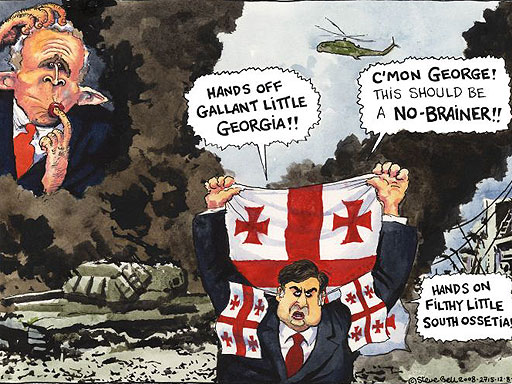'Pipeline war' a misnomer argues Steele
 Jonathan Steele is amongst the most astute commentators on Russia and the former Soviet Union. He has turned his attention to the conflict in the Caucasus and as usual his analysis is largely accurate.
Jonathan Steele is amongst the most astute commentators on Russia and the former Soviet Union. He has turned his attention to the conflict in the Caucasus and as usual his analysis is largely accurate. Steele refutes the notion that the war is focussed on the much cited Baku-Ceyhan pipeline which carries oil to the west from Azerbaijan. The pipeline is merely incidental to the violence.
“The …pipeline is only a minor element in a much larger strategic equation: an attempt, sponsored largely by the United States but eagerly subscribed to by several of its new ex-Soviet allies, to reduce every aspect of Russian influence throughout the region, whether it be economic, political, diplomatic or military”
Georgian president Mikhail Saaskashvili is not only the eagerest exponent of this strategy, he is also the most excitable leader in the region and on this occasion he has over-reached beyond not only his own country’s military capability, but also beyond the capacity of his allies to proffer help. His actions have effectively put an end to the prospects of an improvement in relations with Russia under his tenure.
“Has his escalation of the South Ossetian crisis done more than destroy any chance of normalising Georgian relations with Russia as long as he remains president? Has it reinforced his image among many western leaders as a hothead, and set back his hopes of getting a promise from Nato this autumn to start membership proceedings?”
In Steele’s opinion two courses of action now present themselves to Russia. Either it can remain in South Ossetia and retain the status quo whilst thrashing out a deal with Saaskashvili. Alternatively the Russians might encourage a unilateral declaration of independence from the Ossetians and may even facilitate a referendum on amalgamating the region with its North Ossetian neighbour.
In conclusion, Steele reasons that this disastrous escapade could spell the end for the Georgian president.
“When the fighting ends and the dust settles, Saakashvili may also face an onslaught from his political opposition in Georgia. In the heat of battle, parliamentary leaders have rallied round the national flag, but if a ceasefire comes with all Georgian troops and civilians driven out of South Ossetia and Abkhazia, Saaksahvili may be called to account for losing not just territory but the chance of early membership of Nato as well.”
The Guardian’s coverage of this crisis has far exceeded in quality and subjectivity that of any other national paper.
Meanwhile, if it is possible to extract any humour whatsoever from the lamentable situation in Georgia, two Northern Irish tourists might have managed it(H/T Fair Deal). The News Letter provides the following quote:
“We’re Ulstermen and we’ve paid for this holiday and we’re going to enjoy it. The drink and food is cheap and the people are wonderful and this is a very interesting time to be here – why would we want to go home early?”
Comments